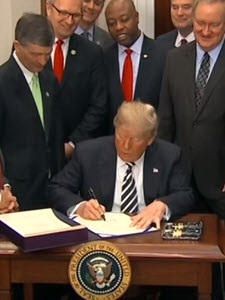Revisions to the 2010 Dodd-Frank Act – including significant Roundtable-supported reforms to the Basel III High Volatility Commercial Real Estate (HVCRE) Rule – were signed into law by President Trump yesterday, two days after the House passed The Economic Growth, Regulatory Relief, and Consumer Protection Act (S. 2155).
 |
Revisions to the 2010 Dodd-Frank Act – including significant Roundtable-supported reforms to the Basel III High Volatility Commercial Real Estate (HVCRE) Rule – were signed into law by President Trump yesterday, two days after the House passed The Economic Growth, Regulatory Relief, and Consumer Protection Act (S. 2155). |
Since 2015, The Roundtable's HVCRE Working Group and industry coalition partners have played a key role in advancing specific reforms to the HVCRE Rule. During next month's Real Estate Roundtable Annual Meeting, HVCRE will be a focus of discussion, with more specific details offered during the Real Estate Capital Policy Advisory Committee (RECPAC) meeting on June 14.
The Federal Reserve announced this week that it will consider a proposal to modify the “Volcker Rule” at a May 30 meeting of its board. As a provision of the 2010 Dodd-Frank Act that puts restrictions on proprietary trading practices at banks, enforcement of the Volcker Rule is currently shared by five separate federal agencies – The Fed, Federal Deposit Insurance Corporation (FDIC), Office of the Comptroller of the Currency (OCC), Securities and Exchange Commission (SEC) and Commodity Futures Trading Commission (CFTC). (Fed Statement, May 23)
 |
The Federal Reserve announced this week that it will consider a proposal to modify the “Volcker Rule” at a May 30 meeting of its board. |
The Dodd-Frank reform bill signed into law yesterday by President Trump exempts banks with less than $10 billion in assets from the Volcker Rule (named for former Fed Chairman Paul Volcker).
Separate bills that would overhaul the process for reviewing foreign investment risk – including a purchase or lease by a foreign party of domestic properties located close to sensitive U.S. facilities – received unanimous approval Wednesday by the Senate Banking and House Financial Services Committees. (Lexology, May 23)
 |
Real estate provisions in S. 2098 appear on pages 7 through 9. |
FIRRMA may be ready for floor consideration in the House and Senate before the August congressional recess. The Trump Administration has shown support for reforming FIRRMA to strengthen CFIUS’ oversight.